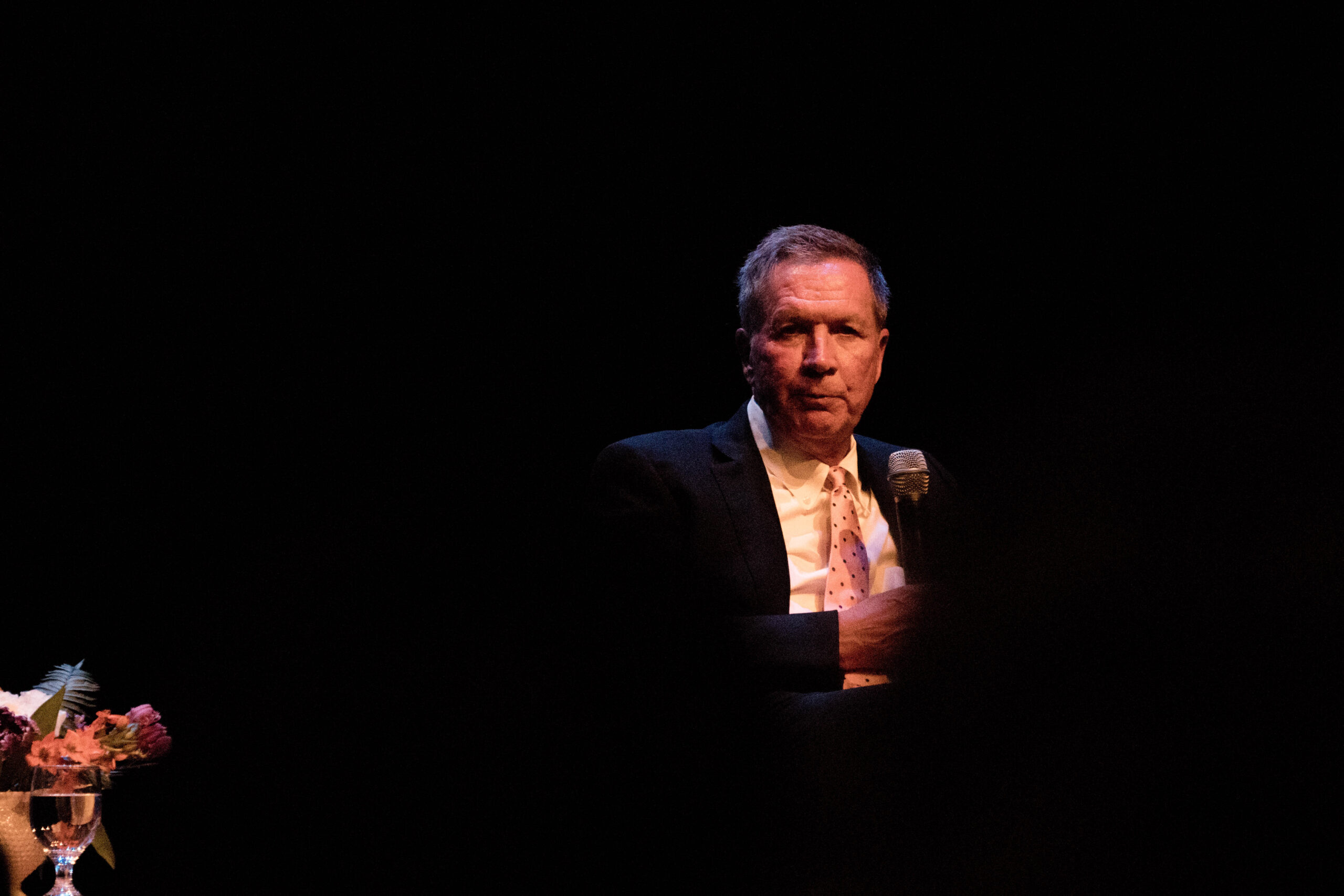What John Kasich did (and didn’t) say at Bowdoin
April 19, 2019

John Kasich wouldn’t say whether he’ll run for president in 2020. However, the former Ohio governor did speak about his disagreements with the Republican Party and fielded what were, at times, confrontational questions from students during an hour-long discussion in Pickard Theater on Monday night.
Donning a pink tie, black suit and black sneakers, Kasich spoke to a crowd of roughly 600 about a range of policy issues, including his record on Medicaid and criminal justice and his humanitarian concerns about the treatment of immigrants coming to the United States from Central America. His central message to students, though, focused not on policy but rather on the idea of public service, as he argued that everyday decisions can matter more than what happens at the top.
“On a day-to-day basis, your life is not affected by the president. It is not affected by the governor, it is not affected by some politician who lives in a faraway place,” Kasich said. “What does that mean? That means that what really matters in this country is you.”
Several students challenged this notion during the question-and-answer period, noting the president’s power to influence policy and public opinion on issues ranging from white nationalism to healthcare policy.
Livia Kunins-Berkowitz ’22, was one student who pushed back. She understood Kasich’s message that individual actions are important but was bothered by his claim that it hardly matters who runs the government.
“That who the president is doesn’t affect you—that’s pretty crazy to me,” said Kunins-Berkowitz. “I knew that was not exactly what he meant, but to say that is so reckless. He was trying to emphasize people power but just did it in a very bizarre way.”
With that attitude, would Kasich himself run for the nation’s highest office? President Clayton Rose asked what would prompt the governor, who was one of 17 Republicans to vie for the party’s nomination in 2016 and the last to officially withdraw from the primaries, to attempt another run.
“Well, if I thought I could win,” Kasich said. “If I were told that, number one, I could win, and it was essential for me to do it, I would report to duty. But that’s not today. There’s no path today.”
Blocking the path, of course, is none other than the current Republican president Donald Trump. In response to a student question, Kasich noted that he was “not all that proud” of today’s Republican Party. He added that he acted against party wishes by expanding Medicaid in Ohio and cited free trade, the growing federal debt and immigration as points of disagreement with the Trump administration.
Still, he did not see a solution in the ideas and policy proposals of the Democratic Party, either, arguing that it had moved too far to the left.
In an interview with the Orient prior to the event, Kasich cited the Green New Deal as one area where the left wing of the party was “off-base.” While he believes that climate change poses a real threat, he suggested market-oriented solutions such as a carbon tax, cap and trade or subsidies for electric vehicles, adding that he drives a Tesla.
Those views push him further from the Republican Party, which explicitly rejected both a carbon tax and subsidies for clean energy in its 2016 platform. Given these discrepancies, why has Kasich stayed a Republican?
“I’m conservative,” he said. “I believe in government as the last resort. Not as a first resort.”
Some of the governor’s comments, such as the repeated statement that he “dealt very effectively with the issue of race” in response to a student question about white nationalism, were met with skepticism and murmurs in the audience dominated by students. Still, several remarks, including a comment about the importance of reducing stigma around treatment for mental health, drew applause.
At the end of the hour, the former Ohio governor said he is next headed to Ukraine to observe the nation’s elections on Sunday. What did he think of Bowdoin?
“You think I wanted to be [at] Bowdoin if I have to turn around and go to Ukraine in a couple of days?” Kasich said. “But I’m glad I came.”

Comments
Before submitting a comment, please review our comment policy. Some key points from the policy: